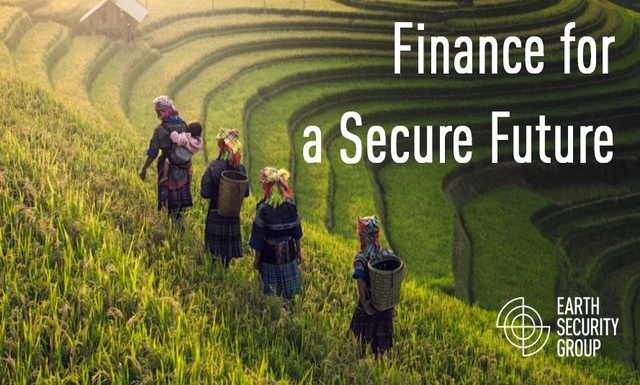
Investment in climate-smart rice production is the cornerstone of global food security
Rice bonds and global climate finance are untapped opportunities to unlock finance for sustainable rice value chains
Leveraging climate finance to scale climate-smart rice production is the cornerstone of global food security and urgently needed to avert civil unrest, a new report by Earth Security Group (ESG) has found.
Proposing three innovative finance solutions to support sustainable rice production in line with the Paris Agreement climate targets, Financing Sustainable Rice for a Secure Future is published today by ESG, with support of the UN Capital Development Fund (UNCDF), the Sustainable Rice Platform (SRP), the leading food and agribusiness company Phoenix, the World Business Council for Sustainable Development (WBCSD), and the Swiss Agency for Development and Cooperation (SDC).
These include a ‘rice bond’ to finance sustainable rice value chains taking advantage of 2020 being a key year for the growth of green bonds in the agriculture sector, as highlighted by the Climate Bonds Initiative. A rice bond would enable a global rice processor, trader, or retailer to provide farmers with capital to transition to sustainable production, improve farming practices, increase yields and revenue, and become more resilient to climate risks.
Coming ahead of the 2019 United Nations Climate Change Conference (COP 25) in Madrid, ESG recommends leveraging international climate finance to attract private sector investment for climate-smart rice production. Country pledges that include rice in their Nationally Determined Contributions (NDCs) would be the first place to start. At present, forty-eight countries include in their NDCs the commitment to reduce greenhouse gas (GHG) emissions from rice paddies but have not yet outlined how they plan to incentivise the private sector to achieve these targets.
Rice is vital to the food security of over half the world’s population (3.5 billion), with Asia accounting for 90% of global rice consumption. In lower-income countries such as Bangladesh, Cambodia and Vietnam, up to 70% of people’s dietary energy comes from rice. The commodity is the source of 10% of global anthropogenic methane emissions. In Southeast Asia – the world’s rice bowl – rice cultivation accounts for up to 25-33% of the region’s methane emissions, and between 10-20% of its overall greenhouse gas emissions.
Under a business-as-usual scenario, the Intergovernmental Panel on Climate Change (IPCC) anticipates that rice production will fall across the world. Asia will be particularly hard hit due to a convergence of land degradation, climate change, and water scarcity.
Larger rice-producing countries such as India and China, with extensive territories that cover a range of climatic zones, will have more space to shift rice cultivation to cooler areas that will become suitable for growing rice. However, smaller producers and importers in the tropical belt, such as countries in Southeast Asia and West Africa, lack such flexibility to adapt.
ENDS
Alejandro Litovsky, CEO of Earth Security Group, said: “The failure of global food systems due to climate change is one of the biggest security challenges we face. A radical overhaul of existing rice production systems is needed in Asia – the epicentre of global rice production and consumption – as well as Africa, which is now also increasingly depend on rice imports to ensure food security. Our report is a call to action for global impact investors to put ‘climate-smart’ rice farming practices at the centre of their impact investment strategies and for governments to use climate finance to attract private investment towards more resilient agriculture systems.”
Esther Pan Sloane, Head of Partnerships, Policy and Communication, UN Capital Development Fund (UNCDF), said: “Sustainable rice has the potential to improve lives and livelihoods in many of the world’s poorest countries, where we work. ESG has shown their unparalleled ability to combine rigorous, well-researched insights with pragmatic action items, as well as the convening power to bring the right partners to the table to move from talking to doing. We are proud to be pioneering new financing vehicles that will help attract private sector capital to support SDG- and climate-positive investments, particularly for those countries most in need.”
Gaurav Dhawan, Executive Chairman, Phoenix, said: “Building sustainable food systems will require leading global companies that help to scale a new way of growing crops: increasing food security and farmer livelihoods while decreasing agriculture’s resource footprint. Phoenix is working actively with partners to realise the commercialisation of climate-smart, gender-inclusive rice production globally. We are delighted to be working with SRP, WBCSD, and Earth Security Group to shape innovative financing partnerships for sustainable agriculture.”
Wyn Ellis, Executive Director, Sustainable Rice Platform (SRP), said: “Rice is critical to global food security; however, it has been largely overlooked as an investment opportunity. SRP’s tools, metrics and guidance can help governments and supply chain actors drive adoption of proven climate-smart best practices. Through our partnership with Earth Security Group, we are developing innovative financial mechanisms that will catalyze wide-scale adoption among the world’s 144 million rice smallholders and achieve sector transformation contributing to the SDGs and climate targets.”
Tony Siantonas, Director, Sustainable Landscapes, World Business Council for Sustainable Development (WBCSD), said: “Mobilizing innovative finance—such as a ‘rice bond’—to support the sustainable transformation of rice-based landscapes is vital for productivity, livelihoods, climate and nature. By collaborating with Earth Security Group and driving action through the Sustainable Rice Landscapes Initiative, WBCSD is bringing business and finance to scale action for healthy people and a healthy planet.”